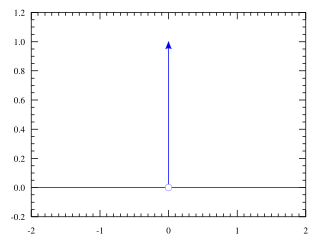Discrete measure

In mathematics, more precisely in measure theory, a measure on the real line is called a discrete measure (in respect to the Lebesgue measure) if it is concentrated on an at most countable set. The support need not be a discrete set. Geometrically, a discrete measure (on the real line, with respect to Lebesgue measure) is a collection of point masses.
Definition and properties
[edit]Given two (positive) σ-finite measures and on a measurable space . Then is said to be discrete with respect to if there exists an at most countable subset in such that
- All singletons with are measurable (which implies that any subset of is measurable)
A measure on is discrete (with respect to ) if and only if has the form
with and Dirac measures on the set defined as
for all .
One can also define the concept of discreteness for signed measures. Then, instead of conditions 2 and 3 above one should ask that be zero on all measurable subsets of and be zero on measurable subsets of [clarification needed]
Example on R
[edit]A measure defined on the Lebesgue measurable sets of the real line with values in is said to be discrete if there exists a (possibly finite) sequence of numbers
such that
Notice that the first two requirements in the previous section are always satisfied for an at most countable subset of the real line if is the Lebesgue measure.
The simplest example of a discrete measure on the real line is the Dirac delta function One has and
More generally, one may prove that any discrete measure on the real line has the form
for an appropriately chosen (possibly finite) sequence of real numbers and a sequence of numbers in of the same length.
See also
[edit]- Isolated point – Point of a subset S around which there are no other points of S
- Lebesgue's decomposition theorem
- Singleton (mathematics) – Set with exactly one element
- Singular measure – measure or probability distribution whose support has zero Lebesgue (or other) measure
References
[edit]- "Why must a discrete atomic measure admit a decomposition into Dirac measures? Moreover, what is "an atomic class"?". math.stackexchange.com. Feb 24, 2022.
- Kurbatov, V. G. (1999). Functional differential operators and equations. Kluwer Academic Publishers. ISBN 0-7923-5624-1.
External links
[edit]- A.P. Terekhin (2001) [1994], "Discrete measure", Encyclopedia of Mathematics, EMS Press


















![{\displaystyle [0,\infty ]}](https://wikimedia.org/api/rest_v1/media/math/render/svg/52088d5605716e18068a460dec118214954a68e9)







